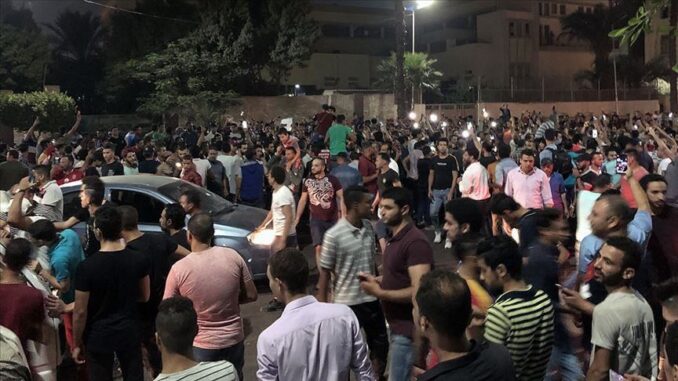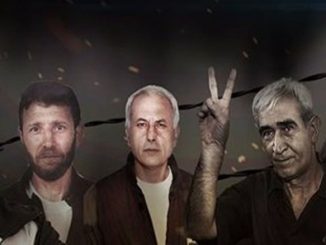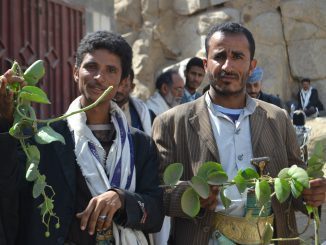
Despite the regime’s tight security grip and the escalating arrests, demonstrators take to streets in ‘Friday of Wrath’ protests, for the sixth day in a row.
Friday was another day of protests as anger over corruption and deteriorating living conditions mounts.
Protests calling for the overthrow of Abdel Fattah al-Sisi erupted in more than 20 villages across Egypt on Friday for the sixth day in a row, despite an ongoing police crackdown targeting the wave of unrest.
Egyptians took to the streets across the country after weekly Friday prayers, demanding the departure of Adel-Fattah al-Sisi.
Several Egyptian social media activists shared footage of demonstrations in Cairo, Giza and Luxor responding to calls by self-exiled Egyptian businessman Mohamed Ali to protest al-Sisi’s rule.
This is the sixth day of protests against the Sisi regime amid deteriorating living conditions in Egypt.
Mohamed Ali urged the Egyptians on his Facebook page to hold street demonstrations on Friday against al-Sisi regime and to “break the fear barrier” in the face of the regime brutal crackdown of the protests.
Egyptian security forces launched random arrest campaigns in the streets, which included searching pedestrians’ phones for photos of the protests.
Amr Magdy, Egypt researcher at Human Rights Watch, said the protests on Friday are “significant, even if scattered and relatively small”.
“Every Egyptian knows that joining an anti-government protest risks not only sending them to jail but also death,” he told Middle East Eye. “The space for civic engagement and independent organization has shrunk so much in Egypt, and society have been deprived from any channel of peaceful expression and mobilization.
“Seven years of repression under Sisi have stripped society of its political parties and independent activism, so any protests that happen in this environment of severe intimidation and risk are a very brave act,” he added.
“The village protests were a result of the high risks associated with demonstrations in major cities, rather than a tactical move by the opposition,” Ayman Nour, head of Ghad al-Thawra party said, according to Middle East Eye.
He described Friday’s protests as “a new wave of the revolution” and a “decisive day” for the anti-Sisi movement in the country.
“There have been a number of protests in recent days since Sunday that have built up momentum for today,” he said. “Today is a real new beginning for the Egyptian revolution.”
Calls for demonstrations have multiplied in recent days, with activists urging participation in what they have dubbed the “Friday of Anger” rallies.
“This is our chance to liberate our country,” Mohamed Ali, a former military contractor, said in a video message posted on Facebook on Thursday.
“Every day, our numbers are rising. There is no difference between Christian and Muslim … secular or liberal, we are the people of Egypt,” he added, urging people to participate in the rallies.
The latest wave of protests came after Ali, who lives in self-imposed exile, last week called on people to take to the streets to commemorate a similar movement for change a year ago.
Since then, several protests have been held, mainly in the governorates of Giza and Beni Suef. Images posted on social media showed demonstrators holding placards and chanting slogans against Egypt’s Abdel Fattah Al-Sisi.
Several videos purporting to show security forces firing live bullets to disperse the crowd were also posted online.
Security services tried to pre-empt the latest wave of protests by launching a campaign of arrests that included political figures such as left-wing political thinker Amin al-Mahdi.
Social media users also reported cafes being forced to close over the past week.
According to the independent Mada Masr news website, at least 150 people have appeared before the state security prosecutor, including 14 minors, this week.
They face accusations such as belonging to a “terrorist” organization, spreading false news and misusing social media, the outlet quoted the defendants’ lawyers as saying.
In a show of dissent, thousands of people rallied in cities across the country in September 2019, demanding the resignation of Al-Sisi following a call to protest by Ali, who, having worked with the military, alleged public funds were wasted on vanity projects for the president and his close entourage.
In response, authorities launched the “biggest crackdown” under Al-Sisi’s rule, rights watchdog Amnesty International said, rounding up more than 2,300 people.
In a video message last week, Ali called on protesters to stay out until their demands are met. “Egyptians unite. Out of love for the Egyptian people, take back your country again. Don’t leave it in Al-Sisi’s hands,” he said. “Do not go home. If we go home, they will detain us. We’re in the streets and now we need to stay there.”
Earlier this month, Ali said last year’s protests were different because demonstrators returned home, “which made it easier for the regime to arrest them”.
“If five million people took to the streets, no one would be arrested at all”.
Egypt outlawed all unauthorized demonstrations in 2013 after Al-Sisi, as defense minister, led the military’s overthrow of democratically elected President Mohamed Morsi following mass demonstrations.
Since then, Egyptian authorities have imprisoned and prosecuted thousands of people, according to human rights groups, with a nationwide crackdown intensifying after Al-Sisi was first elected in 2014 with 97 percent of the vote.
Some Egyptian activists have warned of the danger protesting poses to the lives of demonstrators, given what they called a tight grip on security by authorities.
Police shoot at protesters, kill at least two
Local sources confirm that the Egyptian police forces killed at least two people and wounded three others with live bullets in Al-Blida village, in Al-Ayyat Administrative Center, Giza
Two days ago, a video was circulating online of Egyptian security forces shooting at demonstrators in Kafr Qandil village. The video was dated 23 September and showed several men throwing rocks into an alleyway and running back when they hear the sound of gunshots.
Armed security forces then emerged from the alley and started shooting.
The video was sent to Egyptian human rights activist Hisham Mahmoud by the woman who recorded it.
Egypt’s protests have continued for the sixth day in several areas of Giza Governorate and in Beni Suef, against living conditions in the country where prices have soared in recent months. Demonstrations also erupted in the Assiut Governorate, Upper Egypt.
The demonstrations have erupted in response to a call made by former army contractor Mohamed Ali to unite against the ruling regime on 20 September, the anniversary of last year’s protests against corruption.
Most of the videos of demonstrations are in Egypt’s villages and smaller towns, away from the heavy security presence in central squares in Cairo that have made it hard to protest there.
Social media users are calling on the protesters to stay on the streets until military General turned President Abdel Fattah Al-Sisi is toppled and to move towards the Media Production City where most of the state-run TV channels are headquartered.
Yesterday, there were calls for protests to continue under the hashtag, “Friday of Wrath September 25”.
Police imposed a curfew on southern Cairo at the beginning of the week as residents took to the streets to decry house demolitions which have been taking place across the country.
More than 200 people have been detained from across Egypt on charges of joining a terror group, broadcasting and disseminating false rumors and misusing social media; 150 of them have appeared at the State Security Prosecution.
The Interior Ministry’s National Security Sector (NSS) summoned several former prisoners and asked them to go to their local police station last night and spend Friday in custody as part of preventative measures against the protests.
Sources have said that the NSS has deployed ‘Beltagayya’ (bullies) in areas where demonstrations have been taking place to try and disperse protesters, particularly around police stations.
Mohamed Ali has said that the number of demonstrators is increasing every day which is emboldening others to take to the streets and demonstrate against the regime.
Egyptian pro-Sisi media have acknowledged that protests are taking place, but downplayed their size and impact.
Meanwhile, activists accused international media of failing to cover the protests, while Ali called on Sisi to open major squares for protesters to show the real number of his opponents.
Al-Sisi came to power in Egypt in July 2013, after he deposed the country’s first democratically elected president, Mohamed Morsi.
Human Rights Watch said that Sisi’s reign had witnessed the country’s worst crackdown on human rights in its modern history.



